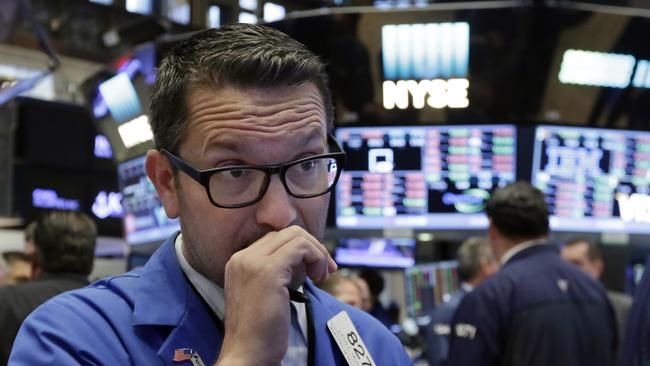Wall St slides as bank shares drop
The ASX is set to slip in opening trade after nervous investors sold financial stocks in the US and Europe.

Shares of banks slid overnight, dragging down major indexes worldwide.
After stocks rallied following central-bank meetings last week, major US indexes notched two consecutive sessions of losses.
In Europe, traders took profits after the central bank-fuelled rallies, with investors also selling off Deutsche Bank over worries about its capital position.
The ASX is set to follow the weak global leads, with ASX futures down 39 points at 6.25am (AEST).
The Dow Jones Industrial Average fell 167 points, or 0.9 per cent, to 18095. The S&P 500 fell 0.9 per cent, and the Nasdaq Composite dropped 0.9 per cent.
Investors sold bank shares in the US, Europe and Japan amid concerns about the capital position of Deutsche Bank ahead of an anticipated legal settlement with the US Justice Department.
Deutsche Bank shares slid 7.5 per cent in Europe to their lowest price in at least 20 years, according to FactSet. A spokesman for the German lender told CNBC that Deutsche Bank remains strong and market speculation was fuelling uncertainty.
Financial shares were among the biggest decliners in the S&P 500 on Monday, falling 1.5 per cent. The KBW Nasdaq Bank Index of large US commercial lenders lost 2.1 per cent. Bank of America fell 2.8 per cent, Morgan Stanley declined 2.8 per cent and Citigroup lost 2.7 per cent.
“It’s going to be tough to have a rally in the market when you hear that Deutsche Bank could be having capital issues and the stock’s at all-time lows,” said R.J. Grant, director of equity trading at KBW.
Declines in bank stocks helped push the Stoxx Europe 600 down 1.6 per cent.
Shares of banks and asset managers have already suffered this year as easy-money policies from central banks have pressured profits at lenders.
Japan’s Nikkei Stock Average fell 1.3 per cent. Banks and life-insurance companies fell after a speech by Bank of Japan Gov. Haruhiko Kuroda suggesting the Japanese central bank was prepared to make further cuts to short-term interest rates.
The yield on the benchmark 10-year US Treasury note fell slightly to 1.589 per cent from 1.615 per cent on Friday. Yields move inversely to prices.
With major central-bank decisions out of the way, global investors were watching a meeting of energy producers and the US presidential election.
US crude gained 3.3 per cent to $US45.93 a barrel Monday after prices sank around 4 per cent on Friday. The Organization of the Petroleum Exporting Countries is set to meet informally in Algiers on the sidelines of an energy summit this week.
Even without a deal to limit production, some investors said a recent stabilisation in oil prices could help improve corporate earnings. Energy companies have weighed on earnings growth in the S&P 500, which is expected to contract again this quarter from the year-earlier period, according to FactSet.
“The earnings recession is in the energy sector as much as anything else and we think the energy sector is going to come out of that,” said Tony Roth, chief investment officer at Wilmington Trust.
Several investors said they were watching Monday’s US presidential debate for signs that a tight race might break toward one candidate or the other, and indications of how that might affect financial markets.
While stock markets have risen steadily over the summer, some investors expect the election, along with the price of oil, to trigger increased volatility in stock markets in October and November.
Dow Jones




